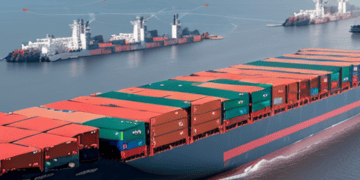In an era marked by significant geopolitical shifts and environmental concerns, the landscape of global supply chains is undergoing a profound transformation. The recent findings from a comprehensive market study by KYU, which surveyed 1000 supply chain and risk management professionals across various sectors, including aerospace, automotive, and luxury goods, highlight the evolving nature of these challenges. These insights, unveiled at a recent press conference, shed light on the complexities facing international companies as they adapt to a rapidly changing world.
Geopolitical Instability and Supply Chain Adaptation: The current global situation is fraught with geopolitical tensions, evident in ongoing regional conflicts such as those in Ukraine, the Red Sea region, and the South China Sea. These challenges have prompted a shift from a traditionally globalized supply chain model to a more regionalized approach, giving rise to the concept of “glocal” supply chains, a blend of global and local strategies.
The Impact of Geopolitical Crises: KYU’s analysis indicates a significant impact of geopolitical crises on international trade. The first three quarters of 2023 saw a marked decrease in trade transactions between geopolitical blocs, a trend that may continue into 2024. This period of uncertainty is further exacerbated by the slowdown in China’s economic growth, which raises concerns about its future geopolitical ambitions.
Sector-Specific Challenges in 2023: The report details the unique challenges faced by various industries:
- Automotive: Despite growth, the sector struggles with economic challenges and labor shortages, exacerbated by a competitive environment in the electric vehicle market.
- Aerospace: Record order books for major manufacturers highlight supply chain pressures, particularly in workforce qualifications, impacting delivery timelines and quality.
- Chemical Industry: The European chemical sector faces competitiveness issues, especially in Germany, due to decreased demand and reliance on fossil fuels.
- Food Industry: Climate sensitivity has led to fluctuating commodity prices, with notable increases in sugar and rice prices due to various factors.
- Logistics: A severe labor shortage in road transport, crucial for European freight, poses a significant risk to growth.
Emerging Energy Sector Challenges: The rapid shift towards renewable energies and the revival of nuclear energy underscore the pressing need for skilled labor and infrastructure maintenance, highlighting capacity and skill shortages as major risks.
Top 10 Supply Chain Risks for 2024: KYU’s barometer identifies several key risks:
- Unpredictable Demand: Post-Covid recovery and shortages lead to overstocks and declining demand.
- Persistent Shortages: Factors like climate events and geopolitical crises continue to affect supply.
- Geopolitical Tensions: Ongoing conflicts and tensions, such as those in the Middle East and Asia, pose threats to supply chains.
- Inflation and Global Growth: High inflation rates and sluggish global growth impact consumption and manufacturing.
- Cybersecurity Threats: The interconnection of supply chain stakeholders heightens vulnerability to cyberattacks.
- Skilled Labor Shortage: A global shortage of qualified labor affects various sectors.
- Quality Control Issues: The rapid resurgence in activity post-Covid has led to a rise in quality incidents.
- Climate Crisis: Extreme climate events disrupt production and delivery of goods and services.
- Logistics Challenges: Geopolitical, social, and climatic crises affect maritime freight and road transport.
- CSR Regulations: New regulations necessitate a reevaluation of procurement strategies for sustainable supply chains.















